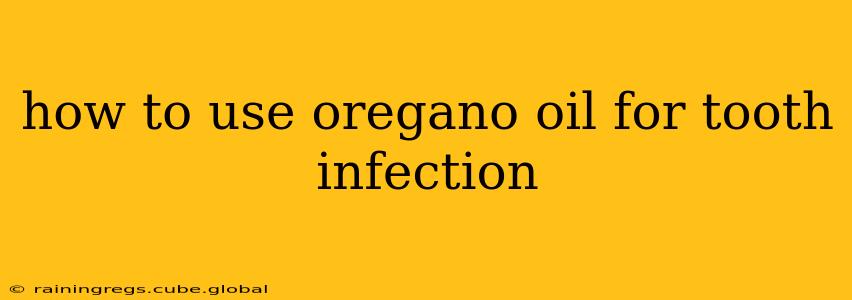A tooth infection, or dental abscess, is a painful condition caused by bacteria. While oregano oil boasts potent antibacterial properties, it's crucial to understand that it's not a replacement for professional dental care. This article explores the potential uses of oregano oil for tooth infection relief, emphasizing the importance of consulting a dentist for proper diagnosis and treatment.
What is Oregano Oil and How Does it Work?
Oregano oil is an essential oil extracted from the Origanum vulgare plant. Its primary active components, carvacrol and thymol, are known for their strong antimicrobial and anti-inflammatory effects. These compounds can effectively combat various bacteria, including some responsible for tooth infections. However, the concentration and application method are critical for efficacy and safety.
Can Oregano Oil Treat a Tooth Infection?
While oregano oil exhibits promising antibacterial properties in laboratory settings, its effectiveness in treating a full-blown tooth infection remains largely unproven in clinical trials. It might offer temporary relief from some symptoms, but it cannot cure the underlying infection. Using oregano oil alone could delay proper medical treatment, potentially leading to more severe complications.
How to Use Oregano Oil for Tooth Infection (with Cautions)
If you choose to explore oregano oil as a supplemental measure alongside professional dental care, proceed with extreme caution:
-
Dilution is crucial: Never apply undiluted oregano oil directly to the affected area. It can cause severe irritation and burns to the sensitive gum tissue. Dilute it with a carrier oil like coconut or olive oil (a ratio of 1:1 or even 1:2 oregano oil to carrier oil is recommended).
-
Precise application: Use a cotton swab to apply a tiny amount of the diluted oil to the affected area. Avoid swallowing it.
-
Limited use: Apply only once or twice daily for a maximum of a few days. Prolonged use can still cause irritation.
-
Monitor closely: Watch for any signs of allergic reaction (rash, swelling, itching). Discontinue use immediately if any adverse effects occur.
What are the Risks of Using Oregano Oil for a Tooth Infection?
The risks associated with using oregano oil for tooth infections are significant:
- Burning and irritation: Undiluted oregano oil can severely burn the gums and oral mucosa.
- Allergic reactions: Some individuals may be allergic to oregano oil, resulting in skin rashes, swelling, or other allergic symptoms.
- Delayed treatment: Relying solely on oregano oil can delay seeking necessary professional dental care, potentially worsening the infection.
- Interaction with medications: Oregano oil may interact with certain medications. Consult your doctor or dentist if you are taking any medications.
Does Oregano Oil Kill Bacteria Responsible for Tooth Infections?
Oregano oil's carvacrol and thymol components have demonstrated efficacy against several bacteria linked to dental issues in laboratory settings. However, the complex nature of a tooth infection, involving various bacterial species and often requiring drainage or antibiotics, means oregano oil alone is unlikely to resolve the problem.
What are the Best Practices for Treating a Tooth Infection?
The best approach to treating a tooth infection is always to seek professional dental care immediately. A dentist can accurately diagnose the infection, determine its severity, and provide appropriate treatment, which may include:
- Antibiotics: To combat the bacterial infection.
- Root canal: To remove infected pulp from the tooth.
- Extraction: In severe cases where the tooth is beyond repair.
- Drainage: To release pus from an abscess.
Can Oregano Oil Help with Other Dental Issues?
While oregano oil's potential for treating tooth infections is limited and should always be complemented by professional dental care, it might offer some benefits for minor dental issues like gingivitis (gum inflammation) when used extremely cautiously and diluted. However, it's not a substitute for proper oral hygiene practices, regular dental checkups, and professional treatment for any significant dental problems.
Disclaimer: This information is for educational purposes only and does not constitute medical advice. Always consult with a qualified healthcare professional for any health concerns or before making any decisions related to your health or treatment. Never attempt to self-treat a tooth infection. Prompt professional dental care is essential for proper diagnosis and treatment.
